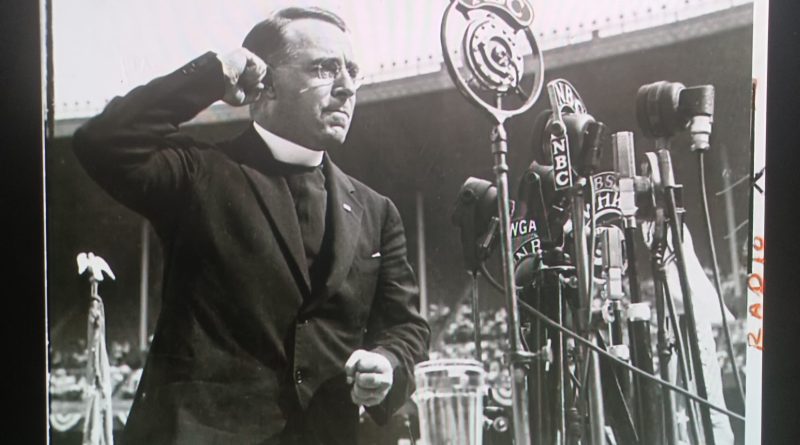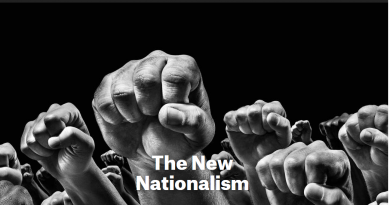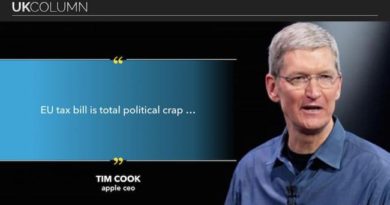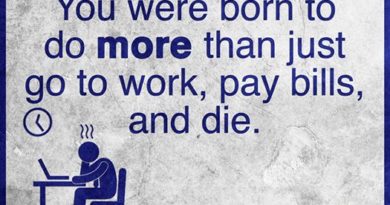Defending the Legacy of Radio Pioneer, Monetary Justice Champion Father Charles E. Coughlin
Mark Anderson
STOP THE PRESSES News Association
February 26, 2023 will mark the 100th year since the late radio priest and social-political-economic activist Charles Edward Coughlin (1891-1979) was incardinated into the Detroit Diocese. But while the orthodox press expectedly throws more dirt on his grave nonstop, the very church that Coughlin rescued from probable oblivion in the earlier part of the 20th Century, in order to expand it into the magnificent National Shrine of the Little Flower Basilica, has downplayed and in some respects besmirched his remarkable legacy. Thus this true soldier for Christ, if he’s remembered at all, is too often regarded as a malevolent malcontent whose activities are still portrayed as bordering on criminality.
Indeed, the church’s website not only “damns with faint praise” Father Coughlin’s hard-fought role in creating the church in Royal Oak, Michigan with its unique octagonal nave and its stunning Crucifixion Tower crafted of marble from the Italian Alps (from which he broadcasted his speeches and public sermons via radio); it also recycles some of the tiresome smears about him, including the crippling claim that he allegedly was an unrepentant “anti-Semite.”
To be fair, visitors to the National Shrine for $5 can purchase a souvenir paperback “Shrine of the Little Flower,” which was written by A.M. Hutting, an assistant to Fr. Coughlin, when the priest was in his heyday. A dedicatory reprint was issued in November 1998. The book does give proper recognition to Coughlin’s widespread acts of charity for, and defense of, the poor, which involved renting local building space to provide clothing, food and other necessities; this effort by Fr. Coughlin and many of the dedicated people in his congregation extended well into the 1930s, even when Fr. Coughlin was preoccupied by being raked over the coals by the Detroit Free Press, other media and the banking establishment for utilizing radio to captain the American people through the turbulent waters of the Great Depression and its aftermath—citing relevant and riveting revelations about the bankers’ dangerous and corrosive monopoly of credit, and its illicit and largely hidden control of the political process.
This paperback, still available through the Shrine’s gift store, details the founding, design and significance of the Shrine and its contents; and, accordingly, it gives Fr. Coughlin the credit that is due to him. However, the old book is not advertised; one must ask for a copy for purchase. (The writer of this blog had no idea the book existed until, in September 2022, I made a general inquiry at the gift store about anything they might have about Fr. Coughlin himself, apart from gifts of a generally Catholic nature.) And although the long hallway adjoining the Shrine’s main entrance, adorned with pictures and memorabilia in the form of a small museum, pays homage to Fr. Coughlin in terms of his dedicated efforts to build the magnificent Shrine, “Coughlin the radio priest” is vastly downplayed, nearly to the point of silence.
Such is the power of the propaganda that has been relentlessly disseminated over nearly a century to libel one of the most passionate and remarkable priests in the history of the Catholic church. From time to time, Detroit-area synagogues still pressure the Basilica, the press and local officials to portray Fr. Coughlin in the most unfavorable manner possible.
What, one may ask, was his unforgivable sin? Via his intensely popular radio broadcasts and associated weekly newspaper, Social Justice, the Canadian-born clergyman and gifted populist orator, from about 1930 until 1942, ventured beyond the usual cadences of the pulpit and shook the cloistered worlds of illicit banking and power politics to their foundations via the microphone. Books, sermon reprints and a newspaper supplemented his radio works.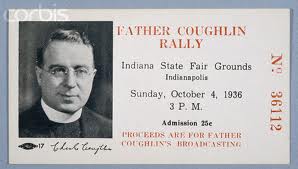
Notably, social justice in those days meant righting the wrongs of the usurious, hopelessly defective and unjust monetary system; it did not mean the leftist-liberal philosophy that it means these days.
Although his radio programs in the latter 1920s were at first purely scriptural in nature, he had an irrepressible sense of justice and an iron constitution, with which he sought to hardwire Christianity into organic society and daily affairs in pursuit of “Christian Americanism,” wherein Christian principles become part of civics, not apart from it. [The Indianapolis ticket shown above is from one of his countless live appearances where he took his radio messages into the field and spoke to often jam-packed stadiums and other venues.]
Accordingly, while utilizing his classic Irish brogue and his uniquely powerful and near-hypnotic delivery, Fr. Coughlin decried the merciless, sinful and fraudulent way that the banking system swindled society and put most people in peonage and into lives of sin and decline. Although the livelihoods and salvation of individuals and families were always foremost in his mind, he railed mightily against the privately owned and controlled Federal Reserve central bank and challenged the dark double-dealings and plutocratic propaganda that fomented both World Wars.
Many of his oratories against the money and war rackets—sturdily based on Pope Leo XIII’s epic late-19th Century encyclical Rerum Novarum and Pope Pius XI’s subsequent Quadragesimo Anno, putting to rest baseless claims that Coughlin was a loose cannon in defiance of Catholic teaching—stand as perhaps the most powerful speeches of the 20th Century, especially in Catholic circles.
Try this link for a nearly 4-minute excerpt of one such speech: https://historymatters.gmu.edu/d/5111/
That above link is an excerpt of Fr. Coughlin’s April 1937 address “Still Paying for World War I.” Here is a link to the entire address: https://youtu.be/t6en3BOOAHg
But Fr. Coughlin’s most “unforgivable sin” was his measured but factual revelation of heavy Jewish control of the banking establishment, as well as deep and well-documented Jewish involvement in the Bolshevik Revolution that murderously overthrew Christian Russia. For this, the notorious “anti-Semite” label that Fr. Coughlin endured when he was alive has, in effect, been “nailed” to his memory, to posthumously “crucify” him. What’s not widely understood is that he felt that everyday Jews should call out their brethren in the power structure who fell into sin and perdition, or who were gripped by power for its own sake and were causing harm. And although tact and decorum were not always Fr. Coughlin’s strong points—he was often startlingly candid and he did make his share of misjudgements and mistakes—he was not a “hater” of anyone. So those who claim that he was the “father of hate radio” are lost in la-la land. Indiscriminate use of the word “hate” is just a cheap verbal device to try and shortcircuit the dissemination of information that some interests want to bury. The likelihood that Fr. Coughlin’s insights might seriously challenge or topple those, of whatever background, who don’t want to surrender their illicit power over the population is what sparked the real haters to project their hate onto Fr. Coughlin—a classic reverse-psychology technique.
Yet, amid the cruel calumny hurled at Fr. Coughlin back in his day and today, no one has ever bothered to ask: Was he really an anti-Semite? Or did he simply state uncomfortable facts while bringing the message of Christ to all peoples, including the Jews, for the priestly purpose of saving souls?
FOR THE RECORD
Fr. Coughlin’s view was that Germany’s National Socialism and Communism were basically variants of a centralized dictatorship, the former being nationalist and the latter internationalist in scope. So while the radio priest occasionally spoke favorably—largely if not totally before World War II—about some of Hitler’s nationalistic public works projects and financial schemes on a practical level, he repeatedly rejected both the National Socialist and Communist ideologies and instead sought a “Christian Americanism” that was nationalistic but was maliciously misrepresented as a species of Hitleresque fascism.
Fr. Coughlin also saw Hitler’s Germany and Mussolini’s Italy as hedges against Soviet communism.
To get some perspective on this angle, here’s a link to Fr. Coughlin’s Jan. 1, 1939 remarks: “Americanism, Neither Nazism Nor Communism.” https://youtu.be/6jRAoUWcYss
Furthermore, in the 1938 broadcast, “The Rightists Go into Action,” he clarified:
Is the federal government more capable and better equipped for managing the affairs [of] the various states than are the states themselves? Communists and Nazis, both of whom adhere to the principle of a strong central government, answer in the affirmative. The disciples of Washington, Jefferson and Lincoln answer in the negative. Nationals—that is, those who believe in nationalism rather than internationalism—also answer in the negative.”
And in his early 1939 article, “An American Christian Program,” Fr. Coughlin, amid rising accusations that he was a virtual Hitler disciple who virulently hated the Jews, commented on the recent “Nazi Bund Rally” at Madison Square Garden as follows:
Meanwhile the vast majority of Americans are still Americans; they are sympathetic neither with the Nazi Bund nor with the Communist convention . . . . Thus, if Americanism and Christianity are opposed to both Nazism and to Communism, the time has come for true Americans and true Christians to organize against both.”
So, clearly, the miscreant media, in its never-ending war against Fr. Coughlin’s legacy, has never bothered to read, much less accurately understand, his erudite articles or listen closely to his eloquent and often volcanic speeches that sold out many a concert hall and sports stadium during the Great Depression’s throes. The same can be said about those who pass as Western “historians.” Granted, Fr. Coughlin did say that the communists had “real grievances,” but he clarified repeatedly that the communists were gravely misguided in formulating their often-violent solutions.
For example, Fr. Coughlin acknowledged that Communism rightly “condemns the modern system of capitalism with its legalized usury, its burdensome taxes, its monopolies of industry and its commercial wars,” but, as noted, he was careful to note that the communists’ usually accurate criticisms of monopoly capitalism did not come with workable, morally sound solutions. To get to the core of the money problem, Fr. Coughlin wrote, among other works, the book, “Money: Questions & Answers,” a practical guide released under the auspices of the National Union for Social Justice (NUSJ), a political lobby that he founded in the Detroit area in 1934 to challenge President Franklin Delano Roosevelt’s reelection, among other goals.
The speeches, sermons, articles and books by Fr. Coughlin—who to this day is accused of merely exploiting the vulnerable masses during the Depression and giving the people “scapegoats” to hate—show that, far from being the brutish demagogue he’s portrayed to be, he was actually a highly capable analyst who carefully sorted out the root causes behind the world’s problems. Not only was his criticism of monopoly capitalism (as opposed to genuine free enterprise) not an endorsement of communism; he also felt that ideologies like Communism and Nazism would never have found fertile soil in the first place if Christian America and the West in general would understand their true predicament and drive out “the modern moneychangers” in a Christ-like manner.
Of course, that call to mimic one of Christ’s best-known actions during His ministry on earth is mainly what brought opprobrium upon Fr. Coughlin, though one of the biggest factors is that “polite society” refuses to face the fact that the prime movers and shakers in banking and high finance were, and still are, disproportionately Jewish. Fr. Coughlin also accurately identified Leon Trotsky and scores of other Bolshevik revolutionaries as another disproportionately large Jewish cabal bent on destroying Christian civilization. But he did so because he was a defender of the Christian faith, not because he “hated Jews.” He prayed and worked for the salvation of all, including the Jews, who he hoped would find Christ. (Fr. Coughlin’s listeners included Jews, Muslims and non-believers as well as Catholics and Protestants).
Notably, Fr. Coughlin’s parting of ways with President Franklin Delano Roosevelt over the “New Deal”—after his initial enthusiasm about the federal Depression-era recovery plan—turned the power of the federal government against a man of the cloth whose works had gone viral, reaching beyond 30 million radio listeners at their peak before the priest was driven off the air and into obscurity.
Fr. Coughlin’s fate was sealed when the Vatican pressured him to retire from his radio-based activism. FDR’s administration even went so far as to revoke Coughlin’s U.S. Postal Permit that had enabled him to distribute Social Justice efficiently. That killed the newspaper. The NUSJ was forced out of existence as well.
COUGHLIN’S FINAL YEARS
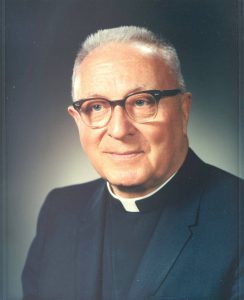
Fr. Charles Coughlin lived out his days in Royal Oak at the church he founded and funded with donations drummed up via his radio show, steadfastly obeying the orders of Catholic authorities to return to daily priest work and put his activism aside. He passed away of heart failure on Oct. 27, 1979, two days after his 88th birthday.
He was laid to rest at Holy Sepulchre Cemetery in Southfield, Michigan, only a few yards away from the grave of Michael Gallagher, the Detroit Bishop who believed in Fr. Coughlin’s works and whose Canonical authority had protected and enabled Fr. Coughlin’s activism to endure for as long as it did. Gallagher’s passing in 1937, notably, created a vacuum filled by a church prelate who was less sympathetic to Fr. Coughlin right when the priest’s crusade was reaching its zenith.
May God rest Fr. Coughlin’s soul. And may he someday have his name cleared. The atrocious accusations continuously aimed at him have been taken at face value for far too long. It’s time to set the record straight. He was shut down because he was right and the people were listening. It’s that simple.
